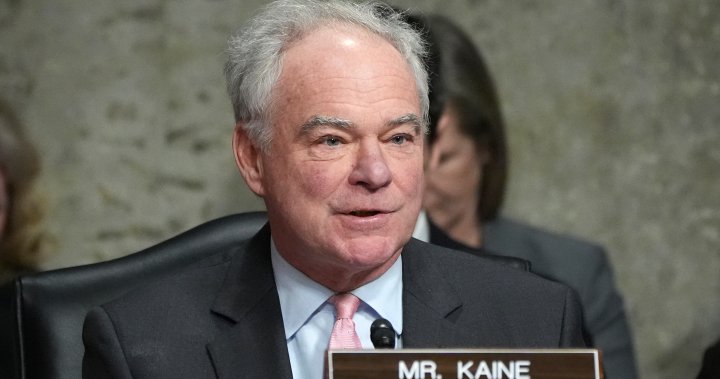With U.S. President Donald Trump’s so-called “Liberation Day” of tariff implementation fast approaching, Senate Democrats are putting Republican support for some of those plans to the test by forcing a vote to nullify the emergency declaration that underpins the tariffs on Canada.
Republicans have watched with some unease as the president’s attempts to remake global trade have sent the stock market downward, but they have so far stood by Trump’s on-again-off-again threats to levy taxes on imported goods.
Even as the resolution from Democratic Sen. Tim Kaine of Virginia offered them a potential off-ramp to the tariffs levied on Canadian imports, Republican leaders were trying to keep senators in line by focusing on fentanyl that comes into the U.S. over its northern border. It was yet another example of how Trump is not only reorienting global economics, but upending his party’s longtime support for ideas like free trade.
“I really relish giving my Republican colleagues the chance to not just say they’re concerned, but actually take an action to stop these tariffs,” Kaine told The Associated Press in an interview last week.
The Senate was due to take up the resolution on Tuesday, but an hours-long filibuster by Democratic Sen. Cory Booker had injected uncertainty on the timing.
Kaine’s resolution would end the emergency declaration that Trump signed in February to implement tariffs on Canada as punishment for not doing enough to halt the flow of illegal drugs into the U.S. If the Senate passes the resolution, it would still need to be taken up by the Republican-controlled House.
That chamber recently approved new language that would avoid having to hold a vote if a House member brought a similar resolution to try and end the emergency. The language, tucked into a continuing budget resolution that prevented a government shutdown last month, essentially declared the rest of the calendar year as one long day — meaning a vote wouldn’t have to be held until 2026.
A small fraction of the fentanyl that comes into the U.S. enters from Canada. Customs and Border Protection seized 43 pounds of fentanyl at the northern border during the 2024 fiscal year, and since January, authorities have seized less than 1.5 pounds, according to federal data. Meanwhile, at the southern border, authorities seized over 21,000 pounds last year.
Kaine warned that tariffs on Canadian goods would ripple through the economy, making it more expensive to build homes and military ships.

Get daily National news
Get the day’s top news, political, economic, and current affairs headlines, delivered to your inbox once a day.
“We’re going to pay more for our food products. We’re going to pay more for building supplies,” he said. “So people are already complaining about grocery prices and housing costing too much. So you raise the cost of building supplies and products. It’s a big deal.”
Still, Trump has claimed that the amount of fentanyl coming from Canada is “massive” and pledged to follow through by executing tariffs Wednesday.
“We are making progress to end this terrible Fentanyl Crisis, but Republicans in the Senate MUST vote to keep the National Emergency in place, so we can finish the job, and end the scourge,” Trump said on social media Tuesday.
Republican leaders in the Senate have signaled they aren’t exactly fans of tariffs, but argued that Trump is using them as a negotiating tool.
“I am supportive of using tariffs in a way to accomplish a specific objective, in this case ending drug traffic,” Senate Majority Leader John Thune, R-S.D., told reporters last month. He said this week that his “advice remains the same.”
Trump first implemented the fentanyl-related tariffs on Canada and Mexico on March 4, but days later he ordered a one-month pause on items — mainly auto parts — that are trades under North American free trade rules in the Canada-United States-Mexico Agreement.
That pause expires Wednesday, which is also when Trump plans to announce a cso-called “reciprocal” tariff policy that matches levies and taxes charged by all foreign trading partners.
A 25 per cent tariff on foreign-made personal vehicles and auto parts is also set to take effect on Thursday, which will come on top of a 25 per cent duty on foreign steel and aluminum.
While Trump’s close allies in the Senate were standing steadfastly by the idea of remaking the U.S. economy through tariffs, others have begun openly voicing their dissatisfaction with trade wars that could disrupt industries and raise prices on autos, groceries, housing and other goods.
“I’m keeping a close eye on all these tariffs because oftentimes the first folks that are hurt in a trade war are your farmers and ranchers,” said Sen. Steve Daines, a Montana Republican.
Sen. John Kennedy, a Louisiana Republican, said he would prefer to see the U.S. and its trading partners move to remove all tariffs on each other, but he conceded that Trump’s tariff threats had injected uncertainty into global markets.
“We’re in uncharted waters,” Kennedy told reporters. “Nobody knows what the impact of these tariffs is going to be.”
Mark Jones, a political science professor at Rice University in Houston, Texas, told Global News that Trump was still enjoying a “honeymoon period” with strong approval ratings among Republicans that will make it hard for party members to break with his agenda.
“You will, though, start to see large numbers of Republican senators, legislators, and other elites begin to move against the president if we see negative economic consequences from the tariffs, which are almost certain if they actually go into force the way they’re being proposed,” he said.
“The more his approval rate (drops), the more you’re going to see Republicans begin to defect on the president.”
—With additional files from Global News
© 2025 The Canadian Press
Read the full article here

